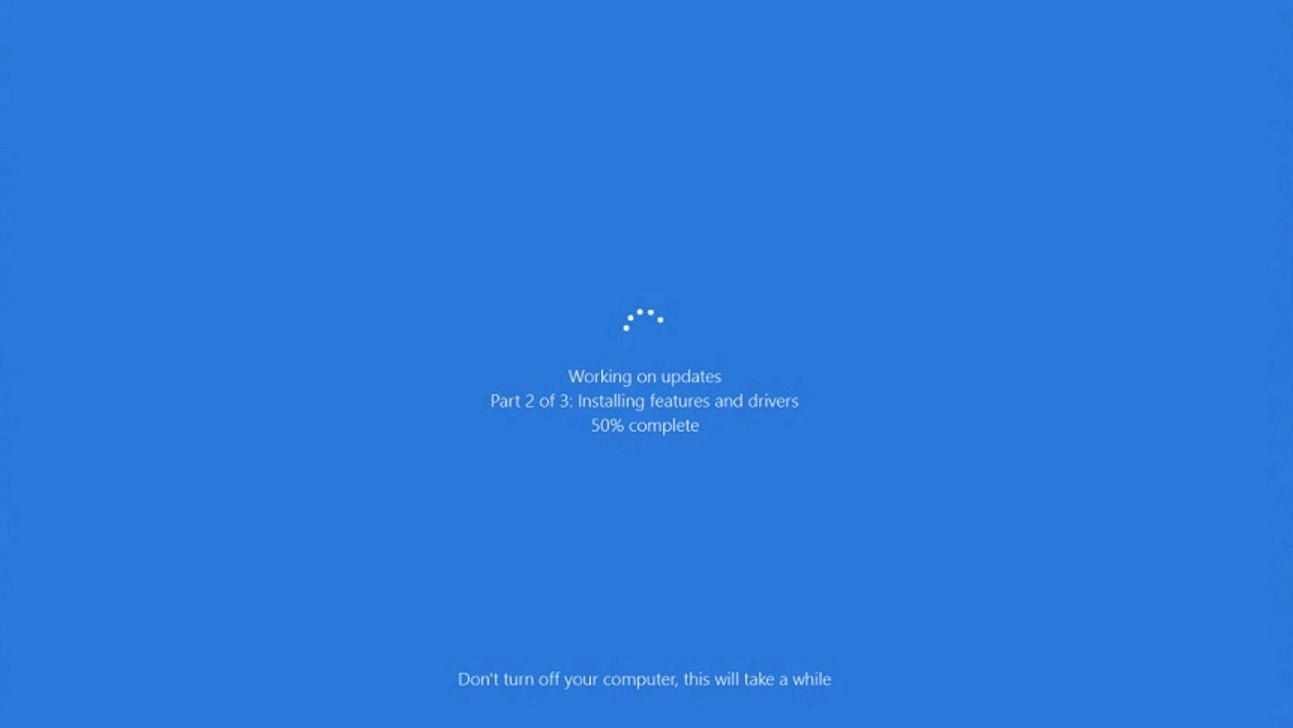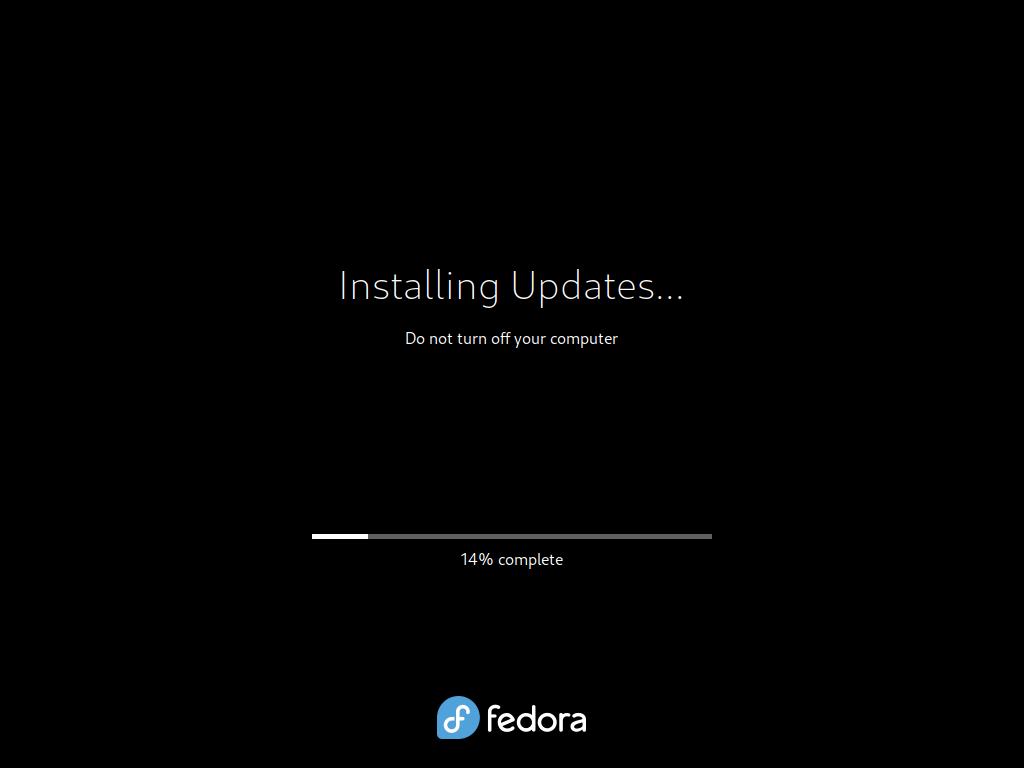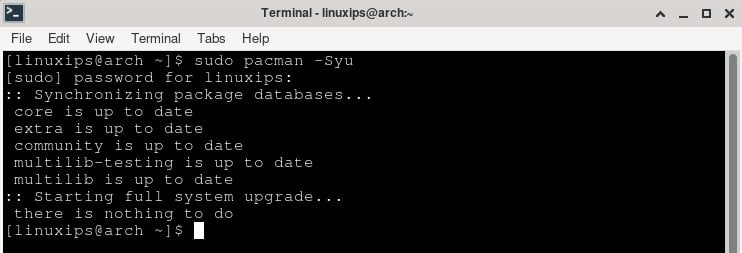

What a real update screen looks like in linux:

The only time Arch is up to date is when it just finished updating.
Are you sure? Some packages might have had time to get updates while you updated!
Let’s compare the update process when you want to shutdown your computer:
Windows:
- Doesn’t leave you the choice: your getting updated now, deal with it
- Starts to update
- Reboots, update for 2 minutes (wasn’t that bad)
- Reboots again, updates for 15 minutes (come on man, I’m gonna miss my train !)
- Reboots AGAIN ! continue and eventually finishes the update
- Shutdown
Fedora:
- We have downloaded updates, do you want to Install them before shutdown?
- Not this time, thank you
- Shutdown Or if you do let it install, reboots always just once, updates 2 minutes, done.
If you have disk encryption or bitlocker, you just can’t let the PC update unattended. Not knowing how many times windows needs to reboot for this update is hella annoying.
I shutdown on windows without updating all the time. Not sure where you’re getting no choice from.
It’s my work laptop, configured by IT. Maybe that’s why.
- Doesn’t leave you the choice: your getting updated now, deal with it
Interesting, my W11 allows me the choice between ‘Shutdown’ and ‘Update and shutdown’. I’ve never had it force an update on me.
For the other points: are you still running Windows on spinning rust or something? I’ve never seen update take longer than a few minutes at most. And why are you waiting for Windows to do its thing? Choose ‘Update and Shutdown’ and go catch that train.
Maybe I don’t get choice because it’s the laptop provided by my company for work. It’s not old rust, it’s new from this year and has 32GB or RAM and and SSD and a rather powerful CPU. It is fucking slow to do anything tho ! My older laptop still had windows 10 and would take 30s to boot up, this new one takes 5 to 10 minutes ! Just open a Excel sheet takes 45 seconds…
Could be they enforce the update process through policies, while annoying that is not a bad thing perse. On my Linux machine I can run an ancient kernel, leaky libraries and all kinds of vulnerable software and my employer would be none the wiser. Everybody is responsible for maintaining their own machine, no matter if they run Windows or Linux. That’s the other side of the spectrum and pretty bad from a security perspective, in all honesty.
Your slowness could be caused by BitLocker being enabled on an SSD not supporting hardware encryption, causing Windows to do the encryption in software mode. That uses the CPU for encryption and can drastically reduce performance. Might be worth checking out, on those specs Windows really should not be slow.
Only time I have no choice is when I’ve been putting that update off, and off, and off, for a while. I see that little orange dot but I either ignore it, or I snooze it, or whatever. And one day windows is like all right dude, you gotta do this, let’s go.
Don’t usually have these problems in a managed business environment. We update thousands of systems all the time.
It’s as if the problem is with letting users manage systems, regardless of the OS.
Also, I don’t have these problems on my home systems, or any system in my circle that’s managed by me, regardless of the OS. And when I say managed by me, I just mean users aren’t local admins, and I’ve trained them to let me handle app installs and updates. If they see something shiny that they want, let me know and I’ll help them get what they want.
The ones I don’t manage are always a shit show. Like yesterday, told a friend he’d have to fully reset one of his systems, because the user is a local admin, so of course it’s all fucked up. I’m not spending my time tracing what they allowed to be installed because they couldn’t be bothered to read what the malicious app would do. You want to be lazy, you’re paying the price of a reset.
Maybe now he won’t let them run as admin all the time.
Don’t let users run as admin/root, and many problems go away.
Well, you’re probably better at IT than the IT employeed by my company :D
I do not have any privileges on this laptop.
it was an odd choice for fedora to default to reboots for system updates. I can dnf update to avoid it but I keep forgetting.
I think they’re preparing everyone for immutable installations but they’re a long way off from that.
When the kernel is updated, a reboot is necessary to load the new version. Improvements and security fixes aren’t implemented until a reboot. Services and daemons likewise need restart to ensure they’re working. When libraries are updated (OpenSSL or Gnutls for example), they might get run with the wrong version of an application.
i said system updates, not kernel updates.
Not really.
There is a good reason Windows does it.
To guarantee the running state of the system, and to ensure everything runs using the components and versions they were designed to use
No. Its because windows read-locks everything.
In Linux we have post-install scripts to ensure relevant stuff gets restarted as long as it was installed properly. (The improperly installed shit can go fuck itself)
The only time you need to reboot is when you’ve upgraded your kernel without kstuff/ksplice or you’ve glanced at dbus a little sideways.
sigh
Post-Install scripts don’t fix 100% of the issue and dynamic lazy linking is a real thing.
The read-only thing really isn’t the main issue here, and everyone including windows has a way to do post installation stuff, and has a service manager
As an example, a few years ago my system kept erroring due to a gstreamer update. Reboot fixed it (I only remember it because the bug reports were only recently closed).
Probably because apps had half loaded old versions, and were lazy linking new versions.
Furthermore, without doing this, self-recovery is difficult. Because if you update something today, and reboot a week later and your system doesn’t boot, you have no idea what caused it. You’d have to keep rolling back. If you do it on reboot, you can snapshot, update, and if system fails, then rollback automatically after losing nothing.
There’s lots of good reasons
I can easily install multiple versions of coreutils and glibc without issue.
Cool. You do that
Are you going to install multiple versions of every library?
What if it’s a security fix and it’s in issue in your desktop environment, etc
Coreutils and glibc aren’t the only libraries on your system
Some apps might use static linking too so might need to be restarted. Other libraries might be loaded long after the app is started. If you swap libraries half way, it’s not great too
What if you’re copying large files half way and run out of space. That nuked my Linux mint install
Linux distros don’t just copy Windows. They wouldn’t put in the extra effort unless they have to.
Do you think a bunch of developers sit around and don’t evaluate why they’re doing things? And instead just copy from Windows? Nah mate. They do it for a reason
The cool thing about doing it this way is if boot fails, you can rollback easily too. If you’re installing core components randomly, your system might only fall to boot a week later
Removed by mod
Having the control over your system at least gives you the full ability to tweak things. I’ve been daily driving you know what for a couple of years now and have had no breaks even with multiple updates per week. It does the usual web browsing, listening to music, and gaming on Steam with no problems whatsoever.
I was absolutely gobsmacked that I could play hogwartz on the platform which must not be named. If it can play this game…
What on earth are you tweaking and repairing for so many hours?
Not OP, but I’ve been trying to allow an external drive to be written to from a computer in a different room on the same network and I swear to god this shit is impossible.
I do this via ssh / fusefs and it works completely fine. What are you using?
I want to be able to copy from Mac OS to Ubuntu (whatever both current versions are)
This is a project to learn Linux so it hasn’t been super urgent. One day I may switch but this alone has been frustrating enough to say that either me or Linux isn’t ready.
I can share a folder from my Mac that Ubuntu can see and copy from there, but I’d like to skip walking across the house and copy directly to the external drive attached to the Linux machine from the Mac.
I’ve just been following tutorials because I don’t know my command line, like at all. I’ve learned a bunch of stuff, but still can’t do what I want.
I think SSHFS would work for your case as well. You’d have to enable SSH on your Mac to do it.
This is all off-topic for a Linux hate CJ so feel free to message me if you want more details.
Haha ok thanks :)
I’m trying to un-corporatize my life as much as possible. I’m a freelancer and I really like the idea of Linux. For simple things like email, zoom meetings, spreadsheets and invoices, I’ve got it and I love it.
But when I start trying to do networking stuff I know how to do on my Mac is where things start to fall apart.
I have yet to attempt video editing on Linux, but I’m running it on an old laptop my friend was going to throw out so it wouldn’t really be a fair test.
I like Linux in general and I really like the idea of Linux, but this is one of my biggest gripes about Linux, and FOSS overall. They have all these instructions on how you can do this step or that task, but there are never examples that tie it together into a cohesive solution. This is fine if you have a good grasp of how everything works and just need pointers on specific command syntax or usage, but if you only have a general idea about what you want to do, there is nothing out there to give you an idea of how to get started.
Yeah I’m going to wait a while to fully transition. I need a hardware upgrade soon. I may just get a new (used) Mac, wipe my current one and start over with a fresh Linux install on that. 🤷♂️
My shortlist, off the top of my head:
- Trying to solve screen tearing with Nvidia drivers.
- Trying to get LightDM to show me my god damned profile photo on login (still have not succeeded)
- Debugging a problem where my DE fails to come up on login unless I manually hop to TTY7 myself
- Endlessly forgetting which of the two or three different directories my
.desktopfiles actually live in, and navigating the poorly-documented format for modifying them - Fixing apps in my taskbar showing generic Wayland icons
- Trying to have any consistent success at all with Bluetooth
- Trying to figure out which fucking audio stack my distro actually uses so I can know for sure whether the magic incantation on StackExchange will fail because it’s for the wrong stack or fail because it’s the correct stack and the stack is garbage
- python2 and python3 symlink hell
- Faffing around with WINE settings
I thrive in the pain. But yes, there is plenty of pain.
Now here’s someone who uses Linux. 😆
Removed by mod
I thought “saving 2 seconds of boot for the cost of [endless pain]” was a dig on systemd and I respected how brave OP was to speak out against fans of The Blob.
Then it was about Linux in general and I wonder whether OP saw a good stable distro before Lennart’s Tumour started growing in it. Even upstart was faster, and easier to configure.







